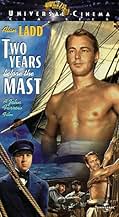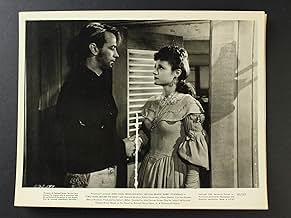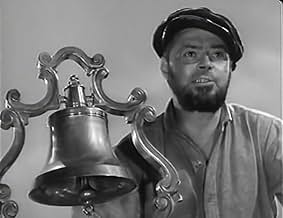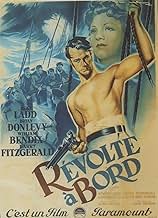AVALIAÇÃO DA IMDb
6,9/10
590
SUA AVALIAÇÃO
Adicionar um enredo no seu idiomaThe playboy son of a wealthy shipping magnate discovers at first hand the desperate privations suffered by the crew of one of his father's ships after he is unwillingly press-ganged aboard.The playboy son of a wealthy shipping magnate discovers at first hand the desperate privations suffered by the crew of one of his father's ships after he is unwillingly press-ganged aboard.The playboy son of a wealthy shipping magnate discovers at first hand the desperate privations suffered by the crew of one of his father's ships after he is unwillingly press-ganged aboard.
- Direção
- Roteiristas
- Artistas
- Prêmios
- 3 vitórias no total
Stanley Andrews
- Policeman
- (não creditado)
Byron Barr
- Friend
- (não creditado)
Ted Billings
- Crimp
- (não creditado)
- Direção
- Roteiristas
- Elenco e equipe completos
- Produção, bilheteria e muito mais no IMDbPro
Avaliações em destaque
When the story begins, a merchant ship has just arrived in Boston and the Captain of this ship has a reputation as a real jerk. That same night, the ship owner's son, Charles (Alan Ladd), is knocked out by a press gang and later awakens on this same ship...forced to become a crewmember on this ship of the damned.
Through the journey, the Captain (Howard De Silva), is a real monster--treating his crew with little respect nor dignity. Over time, the crew begin to die off from scurvy...and yet the captain does nothing to remedy the situation. His only desire is to complete his round the world journey as fast as possible. Eventually it gets so bad that mutiny seems to be the only alternative. What's next?
This film surprised me. At first, I thought it was going to just be another Alan Ladd featured adventure flick...the sort of thing Paramount churned out again and again once he became a star. Instead, I was taken aback by two things. It really was NOT an Alan Ladd film but much more a film with an ensemble cast. It did not rest solely on Ladd's shoulders and the film allowed for several really good performances. De Silva was at his evil best but kudos also to William Bendix, Brian Donlevy, Albert Dekker and young Daryl Hickman. In addition, the film had real depth to it....and was very exciting. It was not just another programmer. Overall, a surprisingly good and exciting adventure film...one I really enjoyed.
Through the journey, the Captain (Howard De Silva), is a real monster--treating his crew with little respect nor dignity. Over time, the crew begin to die off from scurvy...and yet the captain does nothing to remedy the situation. His only desire is to complete his round the world journey as fast as possible. Eventually it gets so bad that mutiny seems to be the only alternative. What's next?
This film surprised me. At first, I thought it was going to just be another Alan Ladd featured adventure flick...the sort of thing Paramount churned out again and again once he became a star. Instead, I was taken aback by two things. It really was NOT an Alan Ladd film but much more a film with an ensemble cast. It did not rest solely on Ladd's shoulders and the film allowed for several really good performances. De Silva was at his evil best but kudos also to William Bendix, Brian Donlevy, Albert Dekker and young Daryl Hickman. In addition, the film had real depth to it....and was very exciting. It was not just another programmer. Overall, a surprisingly good and exciting adventure film...one I really enjoyed.
This is a pretty fair movie about the mistreatment of seamen during the early 19th Century. However, it bears almost no resemblance to "Two Years Before the Mast". For a start, the credits say that the film is "based upon the novel by Richard Henry Dana". That, alone, is a pretty clear indication that nobody involved in the production of the movie had ever read the book because it was definitely NOT a novel. Dana was a college student at Harvard who took a sabbatical to ship out on a vessel belonging to the father of a friend of his in order to regain his health. The book was an account of his experiences, and it was NOT a work of fiction. There was no mutiny nor was anybody on board murdered. As a matter of fact, Dana did not even return on the ship started out on but on another ship that was homeward-bound, because the ship he sailed over on remained in California. Dana returned to Harvard, where he completed his studies and became a lawyer. During the course of his career he not only became an outspoken advocate not only for the rights of seamen, but for freedmen and fugitive slaves as well.
For the benefit of those who may wonder about the peculiar title, the term "before the mast" is an old term used on merchant ships to denotes sailing as a member of the crew, rather than as an officer or a passenger. The officers and passengers lived aft, in cabins. The crew lived up forward , not in cabins but in a single compartment that was originally called the "fore castle", but which was generally shortened to "focs'l". The "focs'l" was located at the forward end of the ship, forward of the masts, so that to sail "before the mast" was to be a seaman. Incidentally, although modern seamen live in individual staterooms, to this day many still refer to their stateroom as their "focs'l". Of course, none of the above applied to Navy ships, in which the officers lived in a "wardroom" and where there was no such thing as a "focs'l".
As a swashbuckling adventure movie "Two Years Before the Mast" compares favorably with others of that genre. However, those interested in the contents of Dana's book would be recommended not to take anything from this movie as representative of it.
For the benefit of those who may wonder about the peculiar title, the term "before the mast" is an old term used on merchant ships to denotes sailing as a member of the crew, rather than as an officer or a passenger. The officers and passengers lived aft, in cabins. The crew lived up forward , not in cabins but in a single compartment that was originally called the "fore castle", but which was generally shortened to "focs'l". The "focs'l" was located at the forward end of the ship, forward of the masts, so that to sail "before the mast" was to be a seaman. Incidentally, although modern seamen live in individual staterooms, to this day many still refer to their stateroom as their "focs'l". Of course, none of the above applied to Navy ships, in which the officers lived in a "wardroom" and where there was no such thing as a "focs'l".
As a swashbuckling adventure movie "Two Years Before the Mast" compares favorably with others of that genre. However, those interested in the contents of Dana's book would be recommended not to take anything from this movie as representative of it.
It's been years since I read the book but as I remember it there was no Allan Ladd figure in it, a ne'er do well who is shanghaied aboard the cargo ship Pilgrim. There was just Richard Henry Dana who had dropped out of Harvard because of faulty vision and signed aboard because he thought it might help clear his sight. He didn't go back to college but he left an enduring and compelling account of his trip in the 1840s from Boston to the California coast, and his return aboard the Alert.
The record wasn't only accurate. It was colorful and even lyrical. Herman Melville acknowledged it as an inspiration for Moby Dick. It's an amazingly evocative narrative. Dana Point in southern California is named after him. He and his mates stood atop the cliffs and flung cow hides down to the sailors below, to be loaded aboard the ship.
California at the time was a province of Mexico, and places like San Francisco ("Yerba Buena") and Los Angeles were villages surrounded by large Spanish land grants and ranches. Dana was a humanitarian and, coming from New England, an anti-slavery activist. His purpose was to leave an accurate record of the life of sailors aboard American ships, documenting their characters and their mistreatment.
That's about what I remember from the book. The 1946 movie with Allan Ladd seems to owe a good deal to Jack London's "Sea Wolf", the story of a wealthy young shipwreck survivor picked up by a ship and coerced into working as a members of the crew by a captain who was a madman. This skipper, Howard Da Silva, isn't nuts but insists the men carry out his wishes as if they were the word of God. Maybe Captain Bligh was the inspiration here.
Life on the Pilgram is a rough life. Ladd is assigned the most menial of duties on the deck force while a very young stowaway is appointed cook's helper. In terms of working hours, cooks have one of the roughest jobs of all. They don't strain their muscles, as we had to on the deck force of a Coast Guard cutter, USCGC Gresham, but they have to get up before any of the rest of the crew and start preparing breakfast. And they don't stop working until they've finished cleaning up after the last meal of the day, hours after the day workers have stopped.
The deck force is no picnic either. Everyone on my ship knew the story (possibly "fake news") of the boatswain's mate on a neighboring ship who slapped a seaman across the face and gave him a bloody nose, then made him get on his knees and holystone the blood off the wooden deck. The Chief BM on the Gresham went no farther than raising fist over me and threatening to belt me. Oh, it was rough duty. The blond young Swedish maids helped ease the pain.
Where was I? Yes, no sea duty today compares to what these guys go through -- twenty lashes for looking cross-eye at an officer, and so forth. What's always puzzled me is, if they're going to administer lashes, why do they always rip the shirt down his back? Why not ask him to take it off? Brian Donlevy plays Richard Henry Dana, writing the book in his spare time.
The book, as I say, was a literary gem. Dana captured the experience of working on a sailing ship, including the floggings and the scurvy. (Viz: "Limeys.") Beyond that he gave us treats on landfalls, storms, and ice bergs. Da Silva is the uncompromising and humorless captain. William Bendix is the brutal First Mate Amazeen who gets to belt Ladd on the face. If the producers needed someone to beat hell out of Ladd, more than once it was Bendix. The two men were friends, despite a temporary falling out over Ladd's lack of interest in enlisting during the war.
In Pernambuco, the Pilgrim acquires a passenger -- a beautiful young woman, what else? Compare this to The Sea Wolf, which also picks up a pretty young girl and Jack London's prose turns to mush. Actually, here, Esther Fernández as the requisite romantic role, is quite attractive and gives a respectable performance. Her career flourished in her native Mexico.
I don't think I'll give away the ending except to say there is a violent clash, some deaths, and a victory of sorts. You'll probably enjoy the move. It's aglow with resentment and tension.
The record wasn't only accurate. It was colorful and even lyrical. Herman Melville acknowledged it as an inspiration for Moby Dick. It's an amazingly evocative narrative. Dana Point in southern California is named after him. He and his mates stood atop the cliffs and flung cow hides down to the sailors below, to be loaded aboard the ship.
California at the time was a province of Mexico, and places like San Francisco ("Yerba Buena") and Los Angeles were villages surrounded by large Spanish land grants and ranches. Dana was a humanitarian and, coming from New England, an anti-slavery activist. His purpose was to leave an accurate record of the life of sailors aboard American ships, documenting their characters and their mistreatment.
That's about what I remember from the book. The 1946 movie with Allan Ladd seems to owe a good deal to Jack London's "Sea Wolf", the story of a wealthy young shipwreck survivor picked up by a ship and coerced into working as a members of the crew by a captain who was a madman. This skipper, Howard Da Silva, isn't nuts but insists the men carry out his wishes as if they were the word of God. Maybe Captain Bligh was the inspiration here.
Life on the Pilgram is a rough life. Ladd is assigned the most menial of duties on the deck force while a very young stowaway is appointed cook's helper. In terms of working hours, cooks have one of the roughest jobs of all. They don't strain their muscles, as we had to on the deck force of a Coast Guard cutter, USCGC Gresham, but they have to get up before any of the rest of the crew and start preparing breakfast. And they don't stop working until they've finished cleaning up after the last meal of the day, hours after the day workers have stopped.
The deck force is no picnic either. Everyone on my ship knew the story (possibly "fake news") of the boatswain's mate on a neighboring ship who slapped a seaman across the face and gave him a bloody nose, then made him get on his knees and holystone the blood off the wooden deck. The Chief BM on the Gresham went no farther than raising fist over me and threatening to belt me. Oh, it was rough duty. The blond young Swedish maids helped ease the pain.
Where was I? Yes, no sea duty today compares to what these guys go through -- twenty lashes for looking cross-eye at an officer, and so forth. What's always puzzled me is, if they're going to administer lashes, why do they always rip the shirt down his back? Why not ask him to take it off? Brian Donlevy plays Richard Henry Dana, writing the book in his spare time.
The book, as I say, was a literary gem. Dana captured the experience of working on a sailing ship, including the floggings and the scurvy. (Viz: "Limeys.") Beyond that he gave us treats on landfalls, storms, and ice bergs. Da Silva is the uncompromising and humorless captain. William Bendix is the brutal First Mate Amazeen who gets to belt Ladd on the face. If the producers needed someone to beat hell out of Ladd, more than once it was Bendix. The two men were friends, despite a temporary falling out over Ladd's lack of interest in enlisting during the war.
In Pernambuco, the Pilgrim acquires a passenger -- a beautiful young woman, what else? Compare this to The Sea Wolf, which also picks up a pretty young girl and Jack London's prose turns to mush. Actually, here, Esther Fernández as the requisite romantic role, is quite attractive and gives a respectable performance. Her career flourished in her native Mexico.
I don't think I'll give away the ending except to say there is a violent clash, some deaths, and a victory of sorts. You'll probably enjoy the move. It's aglow with resentment and tension.
The press gang of the "Pilgrim" recruits a crew and the ship sets sail. Captain Thompson (Howard Da Silva) is only concerned with breaking speed records and has First Mate Amazeen (William Bendix) and Second Mate Foster (Luis Van Rooten) as his side-kicks to run discipline with a rod of iron. There are floggings, rations, neglect and heartless sea burials on his journey. The crew who suffer include Charles Stewart (Alan Ladd), Henry Dana (Brian Donlevy) and Brown (Albert Dekker). Dana keeps an incident log which will change merchant sea law forever. It becomes published and is called "Two Years Before The Mast"
This is a true-life account of conditions at the time and is based upon a book that introduced maritime law. The cast are all good - Howard Da Silva makes an excellent bad guy. I don't usually like children in films but the stowaway Sam Hooper (Daryl Hickman) isn't as annoying as I feared he might be, and his inclusion in the story has relevance in how the crew relate to Charles. Indeed, he also brings out a human side to Mr Amazeen. However, I am not sure what the point of having the 2 passengers was - the film dragged whenever Maria (Esther Fernandez) was on screen. It was good to watch Charles's transformation from a dislikeable oik to a man with a conscience. There were also some humorous moments thrown in, eg, when Charles goes back to eat the chicken he has stolen in front of the crew that hate him. It's a good film but I never understand the point in scrubbing the decks. What's that about?
This is a true-life account of conditions at the time and is based upon a book that introduced maritime law. The cast are all good - Howard Da Silva makes an excellent bad guy. I don't usually like children in films but the stowaway Sam Hooper (Daryl Hickman) isn't as annoying as I feared he might be, and his inclusion in the story has relevance in how the crew relate to Charles. Indeed, he also brings out a human side to Mr Amazeen. However, I am not sure what the point of having the 2 passengers was - the film dragged whenever Maria (Esther Fernandez) was on screen. It was good to watch Charles's transformation from a dislikeable oik to a man with a conscience. There were also some humorous moments thrown in, eg, when Charles goes back to eat the chicken he has stolen in front of the crew that hate him. It's a good film but I never understand the point in scrubbing the decks. What's that about?
In the 1830's, the foppish son of a ship owner is shanghaied aboard his father's ship where he experiences the harsh realities of a brutal captain.
Leonard Maltin gives the movie a 1 & ½ out of 4. Shame on him. Sure, the film is no Mutiny on the Bounty (1935), and the script could be sharper. But, it's still a riveting shipboard drama, thanks to a fine cast, a good story, and a strong moral lesson. In the movie's pivotal role, Ladd transitions from a spoiled fop to a man among men in convincing fashion. The actor was never one to emote; at the same time, his low-key manner blends in well with the macho crew. And a heckuva crew it is—such forceful types as Dekker, Bendix, Donlevy, and, of course, a fearsome Howard DaSilva as the brutal captain. Mix and stir and you've got the ingredients of a highly combustible drama.
Of course, old Hollywood always created its own version of history. It's no secret the studios habitually bent fact in return for commercial appeal. So its not surprising that Paramount took liberties with the Dana book. For example, the script works a woman (Fernandez) onto the ship, which is not in the book. I expect they did that to burnish Ladd's appeal as a leading man and to widen audience appeal to include women-- never mind the facts of the book. As some anonymous wag put it-- never let the facts stand in the way of a good story.
Fortunately, it is a good story, even if the ship never leaves the sound stage. However, I wish director Farrow had made better use of close-ups to underscore dramatic high points. He's too impassive in what amounts to a very involving story. That aside, the movie certainly rates far better than a 1 & ½.
Leonard Maltin gives the movie a 1 & ½ out of 4. Shame on him. Sure, the film is no Mutiny on the Bounty (1935), and the script could be sharper. But, it's still a riveting shipboard drama, thanks to a fine cast, a good story, and a strong moral lesson. In the movie's pivotal role, Ladd transitions from a spoiled fop to a man among men in convincing fashion. The actor was never one to emote; at the same time, his low-key manner blends in well with the macho crew. And a heckuva crew it is—such forceful types as Dekker, Bendix, Donlevy, and, of course, a fearsome Howard DaSilva as the brutal captain. Mix and stir and you've got the ingredients of a highly combustible drama.
Of course, old Hollywood always created its own version of history. It's no secret the studios habitually bent fact in return for commercial appeal. So its not surprising that Paramount took liberties with the Dana book. For example, the script works a woman (Fernandez) onto the ship, which is not in the book. I expect they did that to burnish Ladd's appeal as a leading man and to widen audience appeal to include women-- never mind the facts of the book. As some anonymous wag put it-- never let the facts stand in the way of a good story.
Fortunately, it is a good story, even if the ship never leaves the sound stage. However, I wish director Farrow had made better use of close-ups to underscore dramatic high points. He's too impassive in what amounts to a very involving story. That aside, the movie certainly rates far better than a 1 & ½.
Você sabia?
- CuriosidadesAccording to Howard Da Silva in Alan Ladd's biography, Ladd and William Bendix did not talk to each other although they were friends. Between the scenes everyone went their separate ways.
- Citações
Captain Francis A. Thompson: Mr. Foster, remove his shirt.
2nd Mate Foster: Aye, aye, sir.
Charles Stewart: Never mind. I'll take it off.
- ConexõesReferenced in Rei Leonardo e seus Curtas-Metragens: Anchors Awry or Nautical Nut (1961)
- Trilhas sonorasTake Back the Heart
Written by Claribel (Charlotte Arlington Barnard) and Mrs. G.R. Gifford
Principais escolhas
Faça login para avaliar e ver a lista de recomendações personalizadas
- How long is Two Years Before the Mast?Fornecido pela Alexa
Detalhes
- Data de lançamento
- País de origem
- Idiomas
- Também conhecido como
- Two Years Before the Mast
- Locações de filme
- Empresa de produção
- Consulte mais créditos da empresa na IMDbPro
Bilheteria
- Orçamento
- US$ 2.000.000 (estimativa)
- Tempo de duração
- 1 h 38 min(98 min)
- Cor
- Proporção
- 1.37 : 1
Contribua para esta página
Sugerir uma alteração ou adicionar conteúdo ausente





































